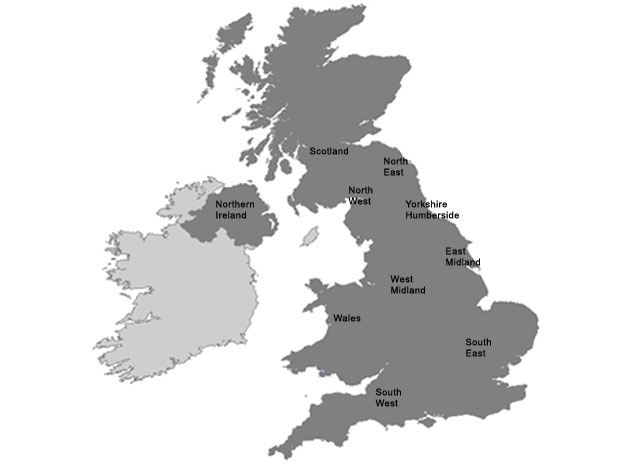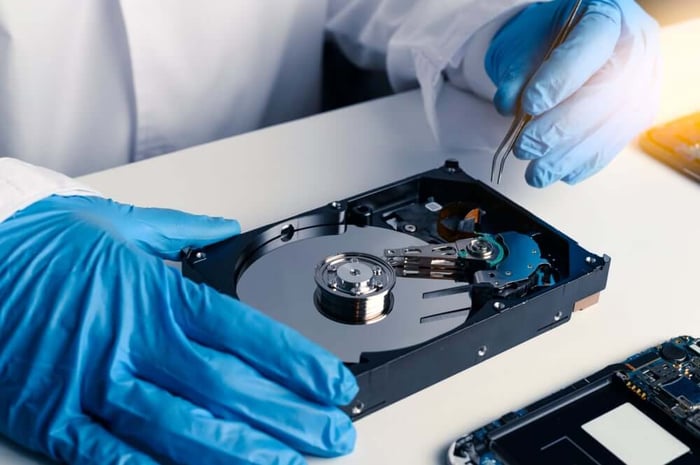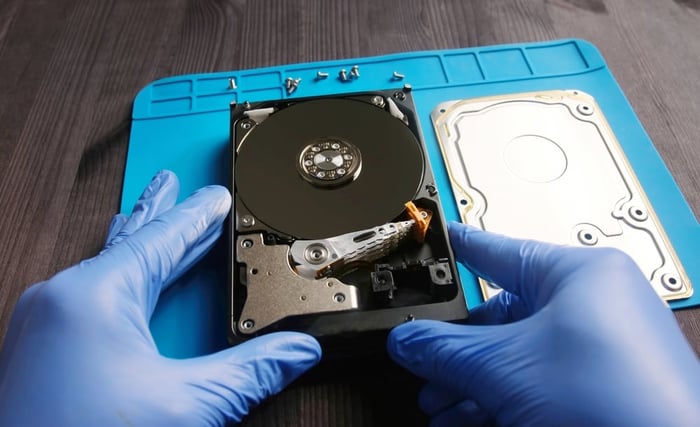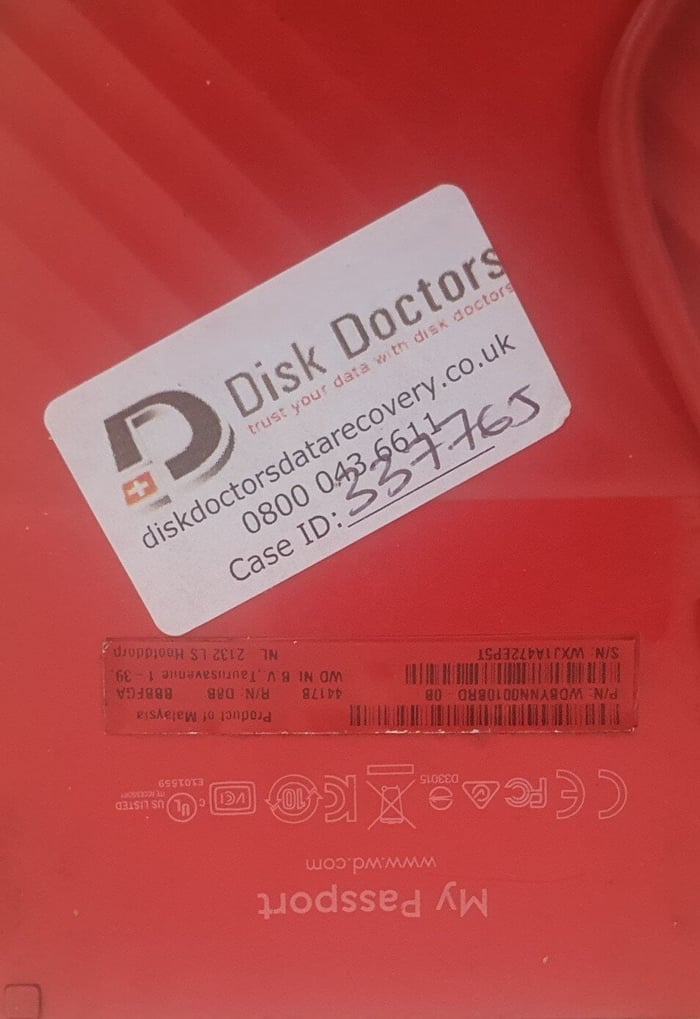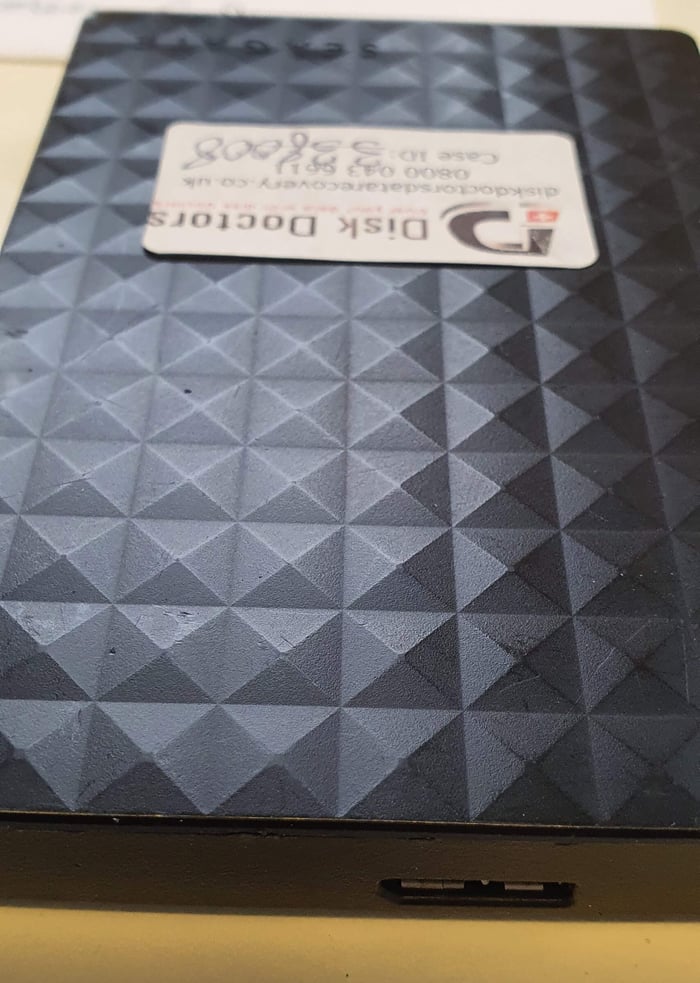Table of Contents
-
- What to Do Immediately After a Hard Drive Failure
- Signs of a Failing HDD
- What to Do After Hard Drive Failure (Step-by-Step Guide)
- Common Causes of Hard Disk Failure
-
- Types of Hard Drive Failures
- Supported Drives and Systems
- Why Acting Quickly Matters
- Preventing Data Loss in the Future
- Why Professional Recovery Is Best
- Need Hard Drive Recovery Support?
-
- FAQs
What to Do Immediately After a Hard Drive Failure
If you experience a hard drive failure, don’t panic. The best thing you can do is stop using it straight away, back up anything still accessible, and then speak to a professional hard drive recovery service. Acting quickly protects your data and increases the chances of a full recovery.
At Disk Doctors, we’ve seen every type of hard disk failure — from noisy drives to complete crashes. With fast action and expert support, there’s a strong chance your files can be saved.
Signs of a Failing HDD
Before diving into recovery steps, it helps to know what to look out for. Common signs of a failing HDD include:
- Clicking, grinding, or whirring sounds.
- Files are disappearing or taking unusually long to open.
- Frequent crashes, freezes, or the dreaded blue screen.
- Boot errors such as “Operating System Not Found.”
Many systems also include built-in monitoring and reporting technology (such as S.M.A.R.T.), which can sometimes flag issues before failure happens. On Macs, tools like Disk Utility can be used to check drive health, though these should be used carefully if the drive is already unstable.
What to Do After Hard Drive Failure (Step-by-Step Guide)
You don't need to fear when your hard drive fails. You can use our step-by-step guide to pinpoint the issue and carry out the necessary repairs. We do recommend using a professional data recovery service to help with your failure, but our general guide below will help you rule out any possible issues, giving you more information to provide to an expert and hopefully help them carry out the repair without data corruption or loss.
Step 1: Stop Using the Drive
Shut down your device or disconnect the external drive. Continued use risks overwriting files, making recovery harder.
Step 2: Check External Causes
Not every issue is a hard disk failure. Check cables, USB ports, or power supplies to rule out simple fixes before assuming the worst.
Step 3: Listen and Observe
Clicking or grinding often points to mechanical failure. A drive that powers up but isn’t recognised could be a logical or electronic issue. Noting the behaviour helps specialists diagnose faster.
Step 4: Avoid DIY Fixes
Recovery software can sometimes help with deleted files but using it on a physically damaged drive may cause permanent data loss. Never open the drive yourself — cleanroom conditions are essential.
Step 5: Back Up Anything Accessible
If you can still reach some files, copy them to a safe location. Prioritise irreplaceable data like photos or business documents. Stop immediately if errors appear.
Step 6: Contact a Recovery Specialist
At this point, expert help is the safest option. A trusted hard drive recovery provider can diagnose the issue and recommend the right solution.
Step 7: Prepare for Professional Recovery
Recovery typically involves:
- Free evaluation and diagnosis.
- Secure cloning of the failing drive.
- Advanced recovery using specialist tools or cleanroom technology.
- Verification of recoverable files.
- Returning data on a secure external device.
This process ensures the highest possible recovery rate while protecting your data.
Common Causes of Hard Disk Failure
While no hard drive lasts forever, certain situations make failure more likely. The most common causes include:
- Physical damage – Drops, knocks, or exposure to water or heat can break delicate internal components.
- Power surges – Sudden electrical spikes can damage the drive’s circuit board.
- Wear and tear – Like any mechanical device, hard drives degrade over time, especially with heavy use.
- Corrupted file systems – Software crashes, malware, or improper shutdowns can lead to logical failures.
- Manufacturing defects – Occasionally, drives fail prematurely due to hidden faults.
Understanding these causes can help you take preventative steps — and know when to act quickly if problems arise.
Types of Hard Drive Failures
Hard drives can fail in different ways, each requiring its own approach:
- Mechanical Failure – Damage to moving parts like read/write heads. Often signalled by clicking sounds.
- Logical Failure – Corrupted file systems, accidental deletion, or formatting errors.
- Firmware Failure – Issues with the drive’s internal code.
- Electronic Failure – PCB damage from power surges or overheating.
Identifying the type of failure is key to a successful recovery.
Supported Drives and Systems
One reason customers trust Disk Doctors' recovery services is our ability to work across a wide range of drives and systems.
Supported interfaces include:
- ATA (IDE, EIDE, PATA)
- SATA (Serial ATA)
- SCSI (Small Computer System Interface)
- SAS (Serial Attached SCSI)
- FC-AL (Fibre Channel – Arbitrated Loop)
- USB (Universal Serial Bus)
Supported operating systems include:
- Windows (all versions)
- MAC
- UNIX, Linux, Sun Solaris, BSD (FreeBSD, OpenBSD, NetBSD)
- Novell
- DOS and other legacy systems
Why Acting Quickly Matters
The longer a failing drive is used, the more likely it is that sectors will degrade beyond recovery. Stopping immediately and seeking professional help maximises the chances of saving your files.
Preventing Data Loss in the Future
Once recovery is complete, prevention is key:
- Keep regular backups on external drives or cloud storage.
- Use monitoring tools and reporting technology for early warnings.
- Protect drives from power surges, heat, and physical damage.
These simple steps reduce the risk of future HDD failures.
Why Professional Recovery Is Best
While free tools may work for minor logical issues, most hard drive failures require specialist intervention. With certified cleanroom labs, advanced tools, and decades of experience, professional engineers can safely handle even complex recoveries. To explore options, see our data recovery services.
Need Hard Drive Recovery Support?
Hard drive failure can feel overwhelming, but with quick action and the right help, recovery is often possible. By following the right steps, shutting down your drive, avoiding DIY fixes, and calling on experts, you give yourself the best chance of saving important files.
If you’ve spotted the signs of failure or your drive has already stopped working, don’t wait. Contact Disk Doctors data recovery london today for safe, secure, and professional data recovery support.
We offer a free collection or a free prepaid shipping label. Call us now or submit a case online.
Frequently Asked Questions
What are the signs of a failed hard drive?
Clicking noises, missing files, slow performance, and frequent crashes are common signs. Built-in tools like Disk Utility or S.M.A.R.T. checks may also warn of issues. If you spot these red flags, act quickly to avoid permanent loss.
Can I recover data after hard disk drive failure myself?
It’s best to avoid DIY recovery unless it’s a simple logical error, such as deleted files. Software cannot fix mechanical failures, and attempts may worsen the problem. For physical or electronic faults, consult a specialist to protect your data.
How long does hard drive recovery take?
Recovery time depends on the failure type. Logical recoveries can take hours, while severe mechanical cases may require several days of cleanroom work. Evaluations are usually quick, so you’ll know early what to expect.
Can all data be recovered after HDD failure?
Not always but acting quickly improves success rates. Logical issues often have higher recovery chances than drives with severe physical damage. Professional tools and environments maximise recovery potential.
How much does hard drive recovery cost?
Costs vary by failure type. Logical recoveries are usually cheaper than mechanical repairs, which require more advanced processes. A free evaluation will give you a clear idea before any work begins.
What should I avoid after a hard drive failure?
Don’t reformat, reinstall your OS, or attempt physical repairs. These actions reduce the chance of successful recovery. The less interference, the better.
Do specialists support all systems?
Yes. Recovery services support Windows, Mac, Linux, UNIX, and other systems across multiple interfaces.



